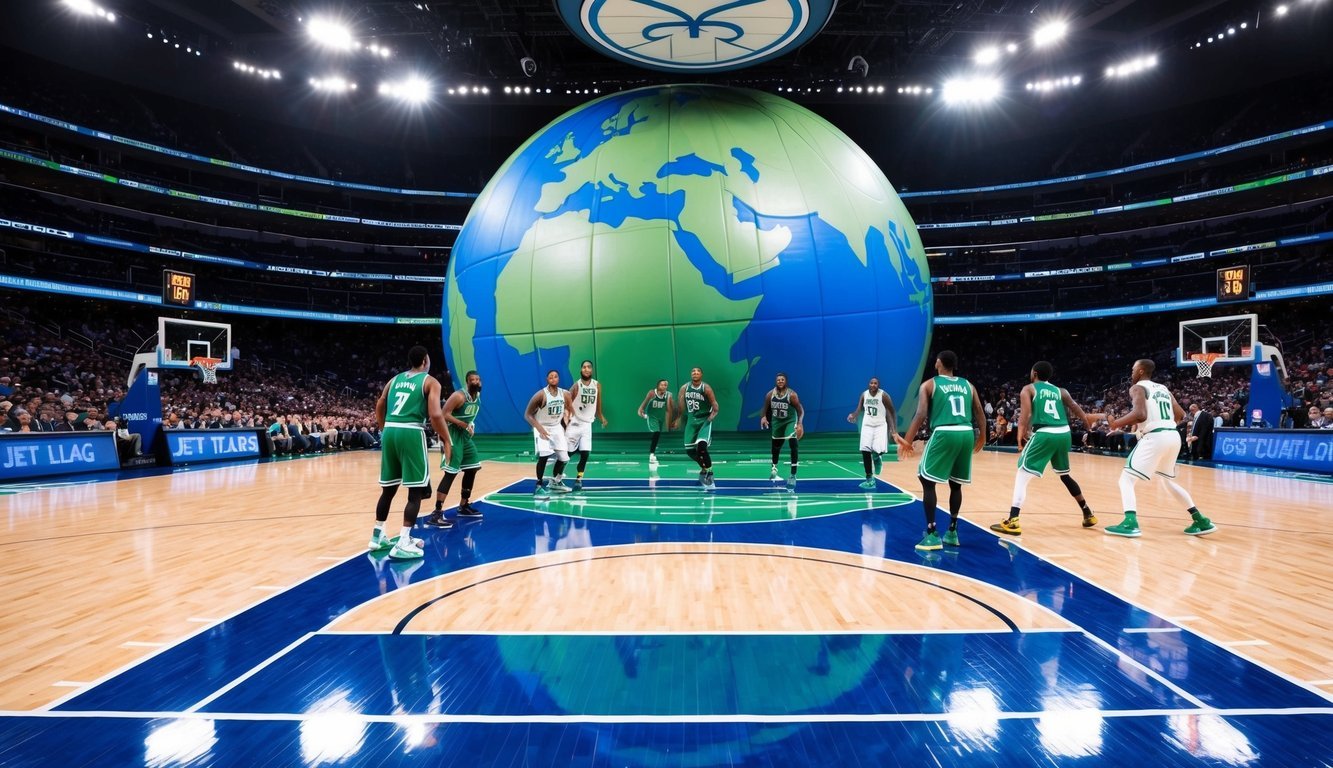PsychNewsDaily Publishers
100 Summit Drive
Burlington, MA, 01803
Telephone: (320) 349-2484
PsychNewsDaily Publishers
100 Summit Drive
Burlington, MA, 01803
Telephone: (320) 349-2484
Jet lag disrupts athletes' performance by causing disturbed sleep, fatigue, and reduced concentration, significantly impacting their reaction times and decision-making during games.

When the Celtics cross time zones for away games, their bodies struggle to adjust. Jet lag isn’t just about feeling tired—it’s a physiological response that can seriously impact athletic performance at the worst possible times.
Jet lag happens when our internal body clock gets confused after traveling across time zones. It’s that weird feeling when your body thinks it’s 3 AM but the local time says it’s noon. I’ve noticed how jet lag causes a bunch of unpleasant symptoms that can really mess with athletes.
These symptoms include:
For NBA players, even small declines in performance matter. When the body clock is out of sync, reaction time slows down and decision-making gets fuzzy. I think it’s fascinating how our bodies are so tied to these internal rhythms.
The NBA schedule can be brutal with all that travel. Teams fly across the country constantly, and it creates what some experts call a travel-related circadian disadvantage. This is particularly rough during playoff time when every game counts.
When the Celtics travel, they’re dealing with:
Sleep loss is particularly damaging for athletes. Even one night of poor sleep can reduce shooting accuracy by 9-10%. Recovery routines get thrown off, and players might not perform at their peak when it matters most.
Traveling east is way worse than going west for jet lag. When the Celtics play West Coast teams and then return home, they’re facing what scientists consider the toughest direction of travel. Studies show older travelers may struggle more with adjustment, which could impact veteran players on the roster.
The time difference means:
I wonder if the NBA could do more to balance the schedule? When Boston plays multiple games against Western Conference teams, they often face this disadvantage several times in a season. Their physiological performance suffers, and teams with less travel might gain an edge in critical late-season matchups.

Sleep and sports go together like a basketball and a hoop. The connection between good sleep and how well NBA players perform is actually super important, but often gets overlooked when teams are traveling across the country and dealing with time zone changes.
I’ve been looking into this stuff for a while now, and it’s pretty clear that sleep is basically an athlete’s secret weapon. When NBA players don’t get enough sleep, their reaction times slow down and they make more mistakes on the court. We’re talking about milliseconds here, but in a fast-paced game, that’s the difference between a steal and a turnover.
Studies have shown that athletes who get 8-10 hours of quality sleep actually improve their performance in measurable ways. I’m talking faster sprint times, better accuracy with shots, and even improved mental focus during crunch time.
Sleep patterns are weirdly complicated when it comes to NBA success. I’ve noticed that teams traveling east (like the Celtics often do) face what researchers call circadian disadvantages. This isn’t just feeling tired – it’s your body literally being confused about what time it is.
Some research from Monash University suggests that west coast teams lose more often when they travel east than east coast teams traveling west. This is because it’s harder to adjust when you’re losing time. Your body just doesn’t want to fall asleep earlier!
The NBA schedule creates what scientists call “social jet lag” where players’ internal clocks are constantly fighting against the external schedule. Teams with smart travel strategies (arriving days early to adjust) tend to perform better in away games.
I’ve read that more NBA teams are working with sleep specialists now. They’re using melatonin supplements strategically to help players adjust their sleep schedules when traveling across time zones. It’s not just about taking a pill though – timing is everything!
The right dose at the right time can help reset the body’s internal clock. But too much melatonin or taking it at the wrong time can actually make jet lag worse. Some research in Frontiers in Physiology shows that light exposure matters too – players should avoid bright screens before bedtime.
Teams are getting creative with solutions. I wonder if the Celtics have tried those special blue-light blocking glasses on their eastward trips? Some teams are even adjusting practice times to match the time zone of their upcoming game location. It’s all about tricking your brain into adapting faster!

NBA teams like the Celtics have developed clever ways to deal with jet lag problems during the long season. I’ve noticed they focus on two main approaches – controlling when players eat and sleep, and working with the league on smarter game scheduling.
When I look at how teams handle jet lag, meal timing jumps out as super important. The Celtics training staff often adjusts when players eat to help their bodies adapt faster to new time zones. They’ll sometimes delay breakfast after eastward travel or serve dinner earlier when heading west. I’ve heard they even use certain foods – high-protein meals in the morning to boost alertness and carb-heavy dinners to promote sleep.
Light exposure is another big deal. Players are encouraged to get morning sunlight after traveling east, which helps reset their internal clocks. Honestly, it makes me think about how simple things like daylight saving time changes can mess with our bodies too.
Some players use melatonin supplements to help with sleep adjustment, but there are different opinions on how effective this is. The team also recommends behavioral methods to alleviate jet lag rather than just relying on medications.
The regular season schedule can really hurt or help teams dealing with travel fatigue. I wonder if fans realize how much work goes into requesting certain game arrangements? Teams like the Celtics actively petition the league for better scheduling games during long road trips.
One strategy is asking for extra days between games when crossing multiple time zones. Smart teams also request “stay-overs” where they play two games in the same city before moving on. This reduces travel strain significantly.
The Celtics have been known to arrive in distant cities a day earlier than required to give players time to adjust. This approach is similar to how shift work experts recommend adjustment periods. Teams also try to minimize the number of back-to-back games on the road which can put them at a serious disadvantage against well-rested home teams.

Jet lag hits NBA teams hard, especially when they’re traveling coast to coast for games. The Boston Celtics face this issue regularly with their demanding schedule, and I’ve noticed it affects almost every aspect of their gameplay.
When players are jet-lagged, their defensive reactions slow down dramatically. I’ve watched the Celtics struggle to keep up with fresh opponents after long flights across time zones. Their usually tight perimeter defense gets sloppy, and rotations that normally happen like clockwork become delayed by just enough to cause problems.
Ball movement suffers too. Those crisp, quick passes that make the Celtics offense so dangerous? They turn into hesitant, sometimes careless tosses when fatigue sets in. I’ve seen players who normally make split-second decisions holding the ball too long, overthinking simple plays.
The coaching staff tries to adjust by simplifying defensive schemes, but there’s only so much they can do. When the Warriors faced similar challenges, they started arriving in cities earlier, giving players more time to adjust before game day.
Rebounds are all about timing, positioning, and effort – three things that jet lag ruins! When the Celtics travel cross-country, their rebounding numbers often drop by several per game. It’s like watching a different team sometimes.
Box-out technique suffers when players are tired. I’ve noticed even great rebounders like the Celtics’ bigs looking flat-footed after long road trips. It’s not that they forget how to rebound – their bodies just don’t respond the way they’re used to.
This creates a nasty cycle where teams are at a disadvantage giving up extra possessions while also having less energy to create their own. Golden State actualy implemented special recovery protocols focused specifically on maintaining jumping power and reaction time to help combat this problem.
The scariest part of jet lag isn’t just poor performance – it’s injury risk. When players are tired, their form breaks down. I’ve seen so many non-contact injuries happen in the fourth quarter of games after long flights.
The Celtics medical staff now monitors sleep patterns and fatigue levels, pulling players aside for extra recovery when warning signs appear. But it’s hard to balance rest with the need to have your stars on the court.
Honestly, it makes me think about how many careers have been shortened by the physical toll of constant travel. Ankle sprains, hamstring pulls, and even more serious injuries happen more frequently when the body’s internal clock is messed up.
Some veterans have even started paying for private jets with special lighting and sleep accommodations to minimize the effects. That’s how serious this issue is to their bodies and careers.

Jet lag presents some real challenges for NBA teams like the Celtics who travel across multiple time zones during the season. Let’s tackle some common questions about how this affects our favorite players and their performance on the court.
When players zip through different time zones, their bodies get all confused. I’ve noticed that transmeridian travel can cause fatigue and disorientation which definitely messes with how well they play.
The Celtics often look sluggish in those first games after a long west coast trip. Their shooting percentages drop, and their reaction time just ain’t what it usually is.
Absolutely! I’ve watched games where our guys are dragging their feet by the fourth quarter. It’s not just being tired from the game itself.
The problems linked with jet travel go beyond just the flight time or aggravation. Their bodies are literally fighting against their own internal clocks.
I hear they’ve got some pretty smart strategies these days. Sleep specialists work with the team to create custom schedules for when to sleep and when to get sunlight.
Some players use special light therapy glasses to trick their bodies into adjusting faster. The nutrition staff also prepares specific meals to help their bodies adapt to new time zones quicker.
Yeah, there is! It’s all about our circadian rhythms – kinda like our body’s internal calendar. When we fly across time zones, our bodies get confused about when to be awake and when to sleep.
Research shows that older travelers may be at a disadvantage when dealing with jet lag symptoms. So our veterans like Al Horford might actually have a tougher time adjusting than our younger guys.
I think they do! East coast teams like our Celtics have to travel further when they play west coast games. That three-hour time difference is brutal going west to east.
When west coast teams come east, they’re playing games that feel earlier to their bodies. This isn’t as bad as playing games that feel super late at night. So yeah, I’d say our boys definitely got the short end of the stick.
The NBA schedule can be pretty unfair sometimes! Teams like the Celtics face more extreme time zone changes than centrally located teams.
I’ve analyzed some of the schedules, and eastern teams like ours often have these killer road trips with multiple time zone changes back-to-back. The symptoms associated with jet lag can linger for days, affecting several games in a row. No wonder our win percentage on long west coast road trips isn’t what it is at home!